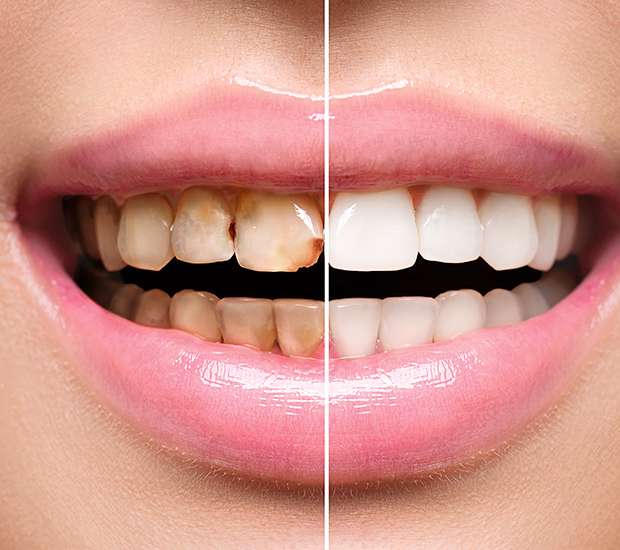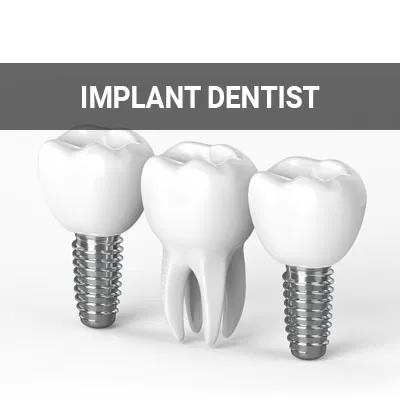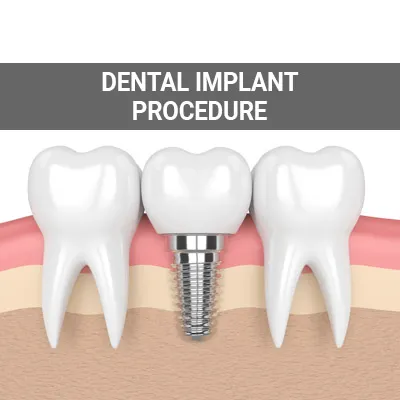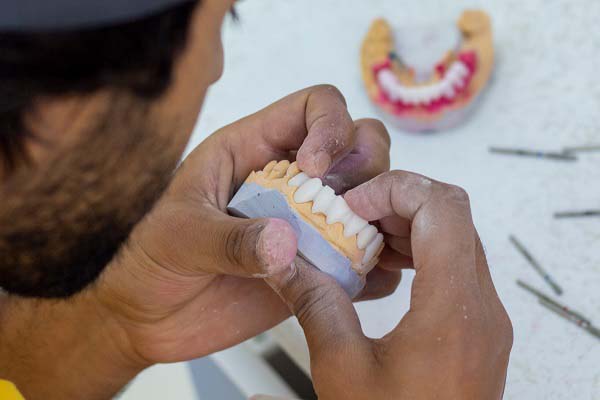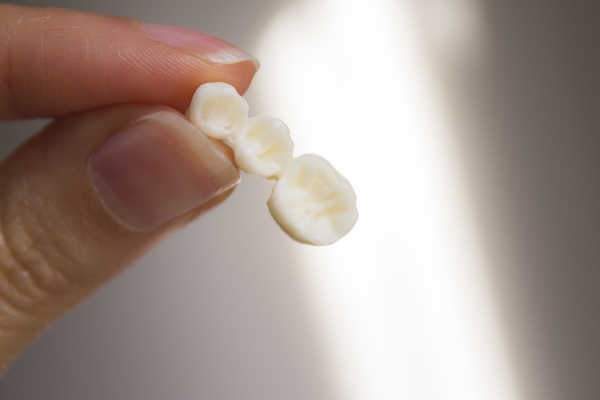Dental Implant Restoration Frisco, TX
Dental implant restorations are one of the most popular tooth replacement options available for people who have lost one or more teeth. Dentists insert these implant posts surgically into the jawbone, so they replace the root of the lost tooth or teeth. Dental implant restoration is a process of restoring the tooth prosthesis, also known as a crown, by supporting it with dental implants.
Dental implant restoration is available at Spectacular Smiles Dental in Frisco and the surrounding area. This dental restoration is popular and preferred by many because they are natural-looking, long-lasting, and restores full dental function. Find out how you can get dental implants by calling (214) 705-3342 to book an appointment.
The Causes of Implant Failure
While the success of the implant process relies on several factors, certain actions and health conditions can increase the risk of implant failure. For example, bruxism and gum disease may harm a healing implant, while conditions such as osteoporosis may make the bone too weak to support or anchor the implant screw. Furthermore, according to the Journal of Clinical and Experimental Dentistry, radiation therapy (especially to the head and neck) from ongoing cancer treatment can inhibit the bones' healing ability.
Additionally, for dental implants to work, there must be enough bone mass to hold the implants securely. If there is inadequate or insufficient bone mass, the dentist may suggest bone augmentation or bone grafting. The oral cavity, especially the teeth and the supporting tissues, must also be healthy for the implants to hold up.
Depending on the location of the implant, smoking can also cause implant failure. The dentist may recommend quitting smoking totally or until the treatment ends. Certain medications, such as antidepressants, may also influence the rate of bone metabolism and affect the osseointegration process negatively.
“While the success of the implant process relies on several factors, certain actions and health conditions can increase the risk of implant failure.”
Dental Implant Restoration Basics
Though dental implants are generally successful, there are occasional instances where restoration or replacement is necessary. Fortunately, a failed implant is easy to remove, and the procedure is relatively common for dentists to perform. If the dentist decides that the implant needs replacement, they will remove it and carefully clean the area. As a result, there will be no bone loss around the implant site if there is no need for a bone graft procedure.
However, if there is bone loss, the dentist may use a bone graft to make the implant restoration process possible. However, it may take several months for the bone to heal before a new implant can be inserted. The dentist may discuss ways to mitigate the risk factors that led to the initial implant failure during the healing process. These preventive measures may include quitting smoking, using mouthguards, and more.
“Though dental implants are generally successful, there are occasional instances where restoration or replacement is necessary.”
Overview of the implant restoration procedure
Each restoration procedure is unique. If complications develop with the dental implant and restoration is necessary, the dentist will conduct an oral examination to determine the severity of the issues and the underlying cause. Our team will answer any questions you may have. The dentist may recommend other dental treatments, such as gum disease treatment, bone grafting, and gum grafting.
When replacing a dental implant, the current implant is typically removed and replaced with a screw-retained or cement-retained restoration. These are the two primary types of dental implant restorations. According to FOR.org, complication rates of both are nearly identical at around 3%. A screw-retained restoration provides secure retention and is easy to tighten if it becomes loose, but it may not be as cosmetically pleasing. Many consider cement-retained restorations to be more attractive, but they are often more difficult to adjust if issues with the implant develop. Our team can help you decide which type is best suited to you.
“If complications develop with the dental implant and restoration is necessary, the dentist will conduct an oral examination to determine the severity of the issues and the underlying cause.”
Check out what others are saying about our dental services on Yelp: Dental Implant Restoration in Frisco, TX
Dental Implant Restoration Aftercare Instructions
Due to the invasive nature of dental implant restoration, patients may experience some swelling or sensitivity at the operation site. While this is normal, proper oral care is vital to prevent infection and irritation. The dentist may suggest getting painkillers to alleviate swelling and discomfort. Ice packs or cold compresses can also work.
Patients should take some time off work after the procedure for recovery. The oral cavity will feel normal within two to five days. However, if sensitivity and pain persist for too long, an appointment with the doctor may be in order. After completing the restoration procedure, it is vital to practice good oral hygiene, including regular brushing and flossing, and regularly visit the dentist for checkups.
“…proper oral care is vital to prevent infection and irritation.”
Questions Answered on This Page
Q. What is involved in a typical dental restoration procedure?
Q. What do I do if my implant feels loose?
Q. What are some of the causes of dental implant failure?
Q. Is dental implant restoration common?
Q. How should I take care of myself after dental implant restoration?
People Also Ask
Q. When is a dental restoration necessary?
Q. What happens during the implant placement surgery?
Q. When should people seek an implant dentist?
Lose and Fractured Implants
If the crown is loose or broken or the abutment that joins it to the implant is loose, it is more likely to be an easy fix. However, If the actual implant post is loose or fractured, things get more complicated. A broken implant post must be taken out and replaced with a new one. The same goes for a loose implant post, but there are cases where the crown may be reused on the new implant. If you have had bone loss, you may need bone grafting and time to heal before receiving the new implant.
No matter what the cause, treat a loose implant as a dental emergency. A loose implant can lead to bone loss and infection, and any type of damage can worsen if ignored. Call our team right away if an implant becomes loose or damaged.
“No matter what the cause, treat a loose implant as a dental emergency.”
Frequently Asked Questions
Q. Is dental implant restoration painful?
A. When you come to the office, the dentist will discuss pain management options with you. Afterward, you can use over-the-counter pain relievers to manage pain. The pain with dental implant restoration is usually minimal if you follow the dentist's instructions.
Q. What happens if damages occur to the implant restoration?
A. The repair procedure depends on the part of the implant that needs repair. If the dental crown suffers damage, the dentist can replace or repair it without touching the titanium implant. If the problem is with the actual implant, the dentist may need to remove the implant and perform a bone graft procedure. It will be impossible to replace a loose implant if the dentist does not correct the issue with the jawbone.
Q. Will other implants fail due to one loose implant?
A. Dental implants have a success rate of more than 95%, which means the chances of failure are low. It is rare for one implant to fail, and even if it does, the others should remain intact. As a precaution, if an injury caused the failure of one implant, you should have the entire teeth checked to ensure nothing else is damaged.
Q. Can I still get dental implants if my tooth went missing a long time ago?
A. Usually, the longer you go without replacing a lost tooth, the lesser your chances of getting dental implants due to loss of bone density. However, this is not a deal-breaker. The dentist may augment the bone or suggest mini dental implants for the tooth restoration process.
Q. How long will my dental implant restoration last?
A. With the proper care, dental implant restorations can last decades. Most patients will not experience any issues after restoration.
Dental Implant Terminology
Call Us Today
Our team offers dental implant restoration to patients who experience complications with artificial teeth supported by implants. If you feel you need a restoration or have concerns with your implant for any reason, give us a call at 214-705-3342 and schedule a time to come in for a consultation.
Helpful Related Links
- American Dental Association (ADA). Glossary of Dental Clinical Terms. 2025
- American Academy of Cosmetic Dentistry® (AACD). Home Page. 2025
- WebMD. WebMD’s Oral Care Guide. 2025
About our business and website security
- Spectacular Smiles Dental was established in 2010.
- We accept the following payment methods: American Express, Cash, Check, Discover, MasterCard, and Visa
- We serve patients from the following counties: Collin County, Denton County, and Dallas County
- We serve patients from the following cities: Frisco, The Colony, Plano, McKinney, Allen, Little Elm, Carrollton, Fairview, Prosper, Lewisville, Addison, and Richardson
- National Provider Identifier Database (1346555216). View NPI Registry Information
- Healthgrades. View Background Information and Reviews
- Norton Safe Web. View Details
- Trend Micro Site Safety Center. View Details
Back to top of Dental Implant Restoration

